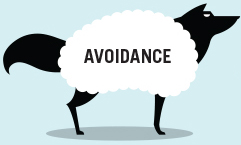Deception
Deception is the deliberate use of uninformative, untruthful, irrelevant, or vague language for the purpose of misleading others. Deception takes many forms. People may be overly vague in what they say, trying to “veil” the truth. They may dodge a question or change the topic to avoid embarrassing or problematic disclosures. The most common form of deception is concealment: leaving important and relevant information out of messages (McCornack, 2008). Table 5.3 explains other types of deception, including avoidance, lying, and being vague.

|

|

|

|
| Changing the topic to avoid revealing troublesome information | Responding with partial truth— |
Presenting a message that is entirely false | Answering questions with ambiguous language, designed to hide the truth |
| Example: A coworker asks if you’ve heard anything about layoffs, and you shift the topic to sports (“Speaking of layoffs, did you hear about the baseball strike?”) to avoid telling him that he’s going to be fired. | Example: Your dentist asks if you’ve been flossing and you say, “Yes, I have”—but you conceal the fact that you’ve only flossed twice in the last month. | Example: You give an informative speech telling your class about “your summer working on a ranch,” but the whole story is made up, based on a post you saw on Reddit. | Example: Your friend asks your opinion about a new dress that she obviously loves, and you say, “It’s so unique!” to hide the fact that you think it looks horrible on her. |
Adrian Niederhaeuser/Shutterstock
131
Deception is especially commonplace online. People can easily hide and distort information in chat or e-
133
Whether it’s face-